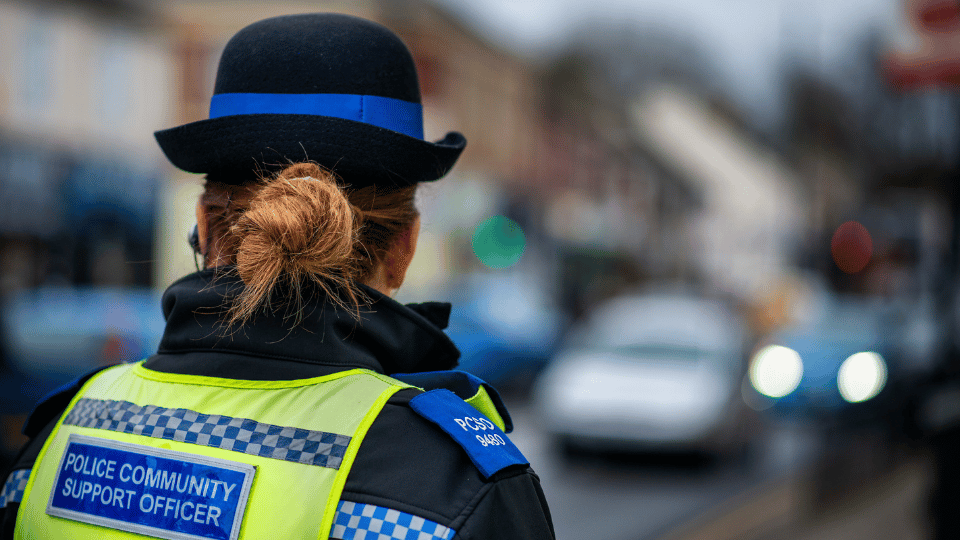Police Community Support Officer (PCSO)
Compassionate. Resourceful. Inquisitive. Sound like you? As a police community support officer you will earn as you learn, gain a fully-funded qualification and make a difference in your local community.

Why should you become a PCSO?
What is a Police Community Support Officer (PCSO)?
As a PCSO, you will work within a neighbourhood policing team to engage with local communities and partners, build positive relationships, identify community issues, and implement solutions to keep communities safe. You will handle incidents within your area, conduct initial investigations, and ensure scene preservation when necessary.
Providing quality service to victims and witnesses of crime and anti-social behaviour is key, including identifying vulnerable individuals and ensuring their safety. You will participate in briefings, operations, and other policing activities.
Your role involves liaising with community partners to resolve issues, prevent crime, and provide advice. Being approachable and adaptable will help you build and maintain positive relationships, making you a respected figure in the community. When it comes to being a PCSO, you must be resourceful, diplomatic, motivated, and connected with the community. While you don’t have arrest powers, handcuffs, or batons, you will rely on your training, communication, and interpersonal skills to manage challenging situations.
You need to stand up for yourself and handle confrontations, but you’ll always have support from police officers and other staff. The camaraderie in this role is unique and invaluable, especially during tough times.
What training will I receive as a PCSO?
You will take part in a 12-15 month apprenticeship programme combining practical and theory-based learning. Your training will start with two classroom phases, lasting around 3 months, based at Ponteland.
From the essentials like safety training and first aid to decision making and communication skills, your study will encompass all the skills and knowledge you need ready for the next step in your training. Some of your study will be delivered as tutorials, role-plays, self- study or e-learning.
Next, you’ll work in frontline policing. You’ll be based at a station alongside your experienced colleagues in a neighbourhood team, working one-to-one with an experienced tutor who will support you in putting your learning into practice as part of your operational duties. You’ll also have the opportunity to shadow experienced PCSOs out and about in the community.
Once you’ve successfully completed all the elements of the PCSO qualification, you’ll be awarded a level 4 diploma in community policing practice. This leads to your end point assessment and achievement of your apprenticeship.
What about my wellbeing?
It’s important to note that those serving in front line roles can face confrontation and aggression, but being physically assaulted is not something that we accept as ‘part of the job’. If you’ve been assaulted in the course of your duty, we have rigorous processes in place to ensure your line manager provides wrap-around support and that a crime is recorded.
What will I learn during my apprenticeship?
The key areas of learning within the apprenticeship programme are:
- Valuing difference and inclusion
- Maintaining professional standards
- Decision making and discretion
- Communication and teamworking skills
- Wellbeing and resilience
- Managing conflict
- Vulnerability and risk
- Problem solving and evidence-based policing
- Supporting communities and partnership building
- Dealing with minor crime
Alongside gaining the specific skills that will set you up for your role as a PCSO, we will
also help you to build transferable skills that you can use throughout your future career.
How will I be assessed during my apprenticeship?
Your knowledge, skills and behaviours will be continuously observed and assessed throughout the classroom phases of your apprenticeship programme by a variety of methods, including:
- Written assessments
- Multiple choice exams
- Role play scenarios
- Presentations
- Reflective accounts
What will I earn?
Starting from Day 1 of your training, your salary will be £25,098 rising to £27,531 after 3 years.
On top of your basic salary, you’ll also be entitled to a generous shift allowance, which could add up to 20% to your take home pay. This could equate to a potential total of £31,748 – £34,826 based on a standard shift pattern.
What qualifications do I need to be a PCSO?
There are some qualifications required to becoming a PCSO as well as eligibility criteria. You can find out more on our PCSO eligibility page.
Do I need to pay for the qualification?
No. The academic costs of the apprenticeship programme are covered by Northumbria Police.
About the Police Community Support Officer (PCSO) apprenticeship
What you need to know before you apply
Take your first steps into policing.
Come and have a go if you think you care enough. What it takes is already in you. Applications to join our February 2026 cohort of Police Community Support Officers are now open. Before you start your application, we recommend you find out more about the application process, eligibility requirements, police staff benefits, and life at #TeamNP. You can also contact our Talent Acquisition team if you have any questions about becoming a PCSO ahead of your application.
